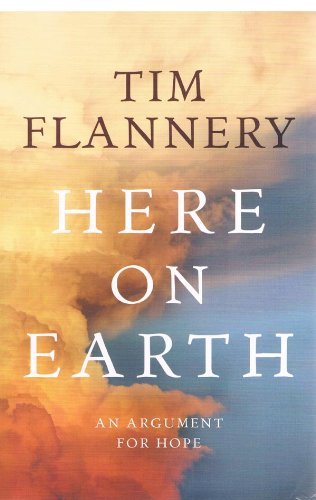Here on Earth: An Argument for Hope
By Tim Flannery
(Text Publishing, 2010, 352 pages)
 Tim Flannery, infamous for predicting that Adelaide would run out of water by 2009, is now proposing that there is hope for us destructive humans yet. The Chief Climate Commissioner's latest work, Here on Earth: An Argument for Hope, claims there are only two options from which the world must choose: self implosion or harmonious integration with our environment.
Tim Flannery, infamous for predicting that Adelaide would run out of water by 2009, is now proposing that there is hope for us destructive humans yet. The Chief Climate Commissioner's latest work, Here on Earth: An Argument for Hope, claims there are only two options from which the world must choose: self implosion or harmonious integration with our environment.
Here on Earth: An Argument for Hope is badly named -- if there is a strong argument in the book, it is lost in a convoluted narrative about earth's history. Based almost entirely on James Lovelock's ''Gaia'' theory, Flannery outlines the development of the world to demonstrate that every living thing on earth is interconnected and dependent on each other.
While this is not a new idea, the simplistic way that Flannery puts forth his case leaves the reader wondering what he actually believes.
A lot of effort is put into explaining that since the dawn of time, humans have left a trail of environmental destruction in their wake. From the time homo sapiens left the trees, it is argued, we have negatively affected the ecosystems around us. Being the most effective predator has meant we have spent our sad, sorry past living beyond our means.
Flannery then tells us that hunter-gatherer societies deserve our deep respect because they understand and revere their surroundings. They alone, it would seem, can live harmoniously with the earth. Perhaps this is just a clumsily oversight in his previous tale of the pernicious early human race.
The division of labour gets the great compliment of ''benefitting our species'' since cave men roamed. Half a page later however, we discover that Adam Smith's version of the principle has turned us into tiny repetitive cogs in the global industrial machine. As a consequence we have lost the ''individual independence and mental acuity'' of the hunter-gatherers.
After demonstrating such little faith in the ability of modern humans, suddenly it is concluded that we can after all, save the world.
The recently appointed Chief Climate Commissioner has conveniently changed his conviction that Australia's capital cities, which were destined for doom, are now magically able to be saved. If Armageddon was Flannery's current catch phrase his recent career change would be utterly redundant.
Predictably, all this leads to a discussion about carbon dioxide emissions and the urgent issue of climate change. What is the cause of this great urgency? Of course: the growth in the mining industry.
Evidence for this revelation is scarce at best. The entire argument seems to be precariously predicated on the theoretical Gaian idea of imbalance.
Interestingly, Lovelock himself admitted in a 2010 Guardian interview that the main international climate centres arc ''more than well aware how weak their science is''. It is unsurprising then that in Flannery's version of events actual scientific facts barely make the cut.
In fact, Flannery goes so far as to blame the mining industry for the development of ''intellectual disabilities and schizophrenia, and even perhaps why murder rates are high in some communities.''
There is no doubt that the climate changes. It has always done so. And organisms have constantly adapted to changing environmental conditions. Darwin called this ''survival of the fittest''. That the wooly mammoth died out 4,000 years ago is not a statement that necessitates blame.
Evolution and adaptation are amoral and to argue, as Flannery does, that competition in the environment is immoral shows a scarily naïve understanding of science and of the world.
Here On Earth is exactly the sermon you would expect Tim Flannery to write. He is consistently inconsistent in describing the supposed fork in earth's environmental road.
It would seem that Flannery's latest work begs an important question of our Prime Minister. With growing evidence that the Australian public doubt anthropogenic climate change, surely the Australian public deserves to have a tax funded ''climate expert'' who is at least able to provide a reasonable, consistent and evidence-based analysis of climate change? Apparently not.
No comments:
Post a Comment